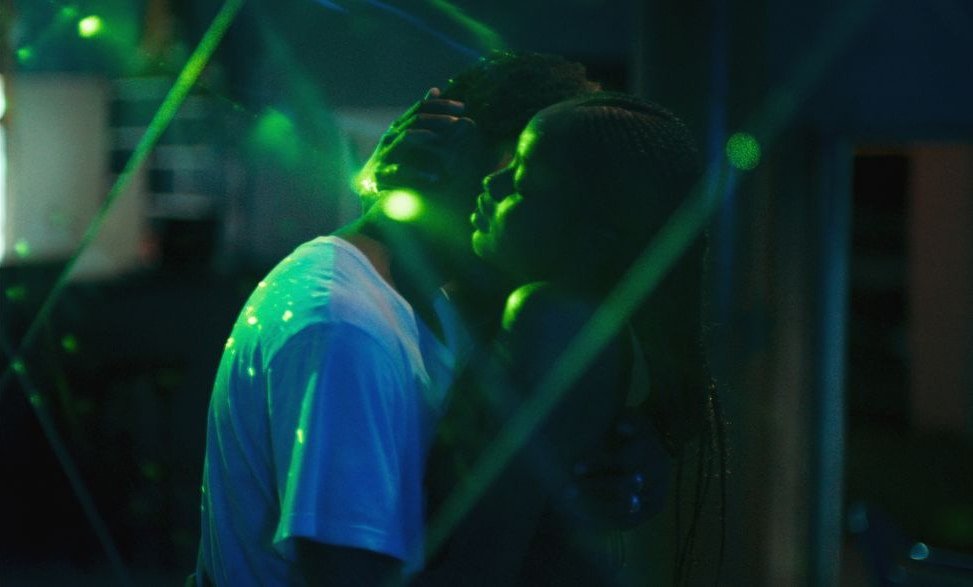The opening images of the already much-admired Atlantics form something like a primer in how best to interpret its often inscrutable text: as a series of intersections. Mati Diop's film opens on the dryest of dry land - the deserts of Dakar - among vast spaceship-like buildings, signifiers of that aggressive new capitalism that seeks to stamp its authority and sear its brandnames onto an earth that's shifting like the sands. Our points of entry into this strikingly unfamiliar universe are those lowly local construction workers first seen downing tools in protest at unpaid wages. This is the future, then, but it's also now; from the off, we're watching an odd mix of social realism and science fiction. The number of non-Caucasian faces on screen also ensures we read Atlantics as unmistakably a film out of Africa, repositioned for just short of two hours as the centre of the universe. After that scene-setting prologue, Diop turns her attention to a coastal love triangle: Ada (Mame Bineta Sane) is torn between Omar (Babacar Sylla), the flash bar owner to whom she's been promised, and Souleiman (Traore), the construction worker to whom she's given her heart. Everybody's at a crossroads, in other words, a situation mirrored by Atlantics' own status. Though Diop's film bobs onto UK screens this weekend, a deal struck at Cannes this summer means the place it's most likely to be seen, as was the case with last year's noteworthy Ghanaian title The Burial of Kojo, is on Netflix. Brave new world indeed.
Once you've taken the time to process that info, curious things start happening. Souleiman is very quickly beamed up or spirited away - on a boat lost in stormy waters en route to Spain, and the prospect of a better life. Ada and Omar's subsequent wedding ceremony - with the bride smuggled into the ceremony beneath a blanket to one of composer Fatima al Qadiri's extraordinary electronic washes - proves as unearthly as anything in the picture. And the merest mention of Souleiman on the wedding night causes the marital bed to catch fire, and not in a good way. If Atlantics had been drawn up along conventional lines, we could describe it as a love story with a beautiful young princess caught between two markedly different suitors, intertwined with a police procedural in which a dogged detective aims to identify who it was who lit the fire. Yet it plainly hasn't been drawn up along conventional lines, and Diop does just about all a director can to make even her tale's more recognisable elements appear unfamiliar. The detective is carrying some kind of sickness that goes beyond a generic weariness of the soul; and the construction workers' wives and girlfriends are seen assuming a zombified state before marching en masse to the the contractor's palatial residence - a sequence that plays stranger still for butting up against a humdrum gynaecological examination. What kind of movie even is this?
There may be no clear or complete answer to that question, but I'll venture that Atlantics is at least a semi-compelling one. Much of the fascination resides in Diop's shotmaking, which owes certain debts, whether to Claire Denis (in whose films Diop has acted), African ghost stories or those nightmares Val Lewton produced for RKO, but otherwise seems content to float off and do entirely its own thing. There's a precision about Diop's craft, honed across several shorts and medium-length features, which may just hook you even as the film's narrative line drifts off towards some far horizon. Working within a reduced frame that possibly mirrors the characters' limited circumstances, the director is attentive indeed as to the people and places she hauls into view; the steady, unforced rhythm of Aël Dallier Vega's cutting - like waves lapping at the feet of a beach - allows us time to appreciate the uncanny beauty of the images Diop composes with cinematographer Claire Mathon (who shot 2013's Stranger by the Lake), whether the camera is dwelling quizzically on the half-built towers looming over Ada's hometown, or returning, as it does time and again, to the unsolved mystery of the sea, carrying with it the enigma of just where Souleiman has disappeared to. We are, for some time, immersed; we go with the flow. Around the midpoint, however, a question popped into my head: is that enough?
Between the brine that surrounds and sustains this story, and the sweat that forms on its characters' foreheads, Atlantics struck me as the kind of film liable to be overpraised as a fever dream, alternating as it does between passages of lucidity that fair burn up the screen and restless murmuring of the type that leads to furrowed brows. The film is at least 85% water, and some of that is of a debatable clarity: I'm not at all sure Diop nails down her central metaphor (why zombies?) in the way Lewton did at far shorter length, and there are places where the film sails beyond the irrational into entirely unfathomable territory. I'd have happily lost one or two of the cutaways to the mute ocean if it meant something more could be communicated. Equally, though, I wouldn't want to compromise the film's vivid sense of a place by the shore that may as well be the very edge of the world, or indeed of an emergent writer-director pushing at the boundaries of what the cinema can do - encouraging us to strike out beyond our usual comfort zones, even if, as that Netflix deal permits, we can now do so from the comfort of our own living rooms. It's a quiet indictment of the prevailing whiteness of that cinema that, in 2019, a trip to Africa might still resemble a safari on another planet, but here we all are, circling the rocks in the same damn ship of fools.
Atlantics opens in selected cinemas, and will be available to stream on Netflix, from Friday.

No comments:
Post a Comment